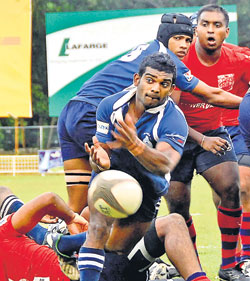| Sports |
|
Talking of basics
|
Last week I talked about slowly. Slowly catching the monkey and as I was talking of the present rugby scene. I had a call form Sanath Martis the coach of St. Peter’s College and the former Under 20 “coach” about how the phrase applies to coaching. This he said while sharing other issues of rugby. Martis believes that in coaching too you have to take a step at a time especially when you have to teach the basics of rugby. This is an area where you cannot rush and expect results. The Basics must be taught so that that a player or potential player masters the key factors, one by one.
For example, if you are teaching how to catch the ball it is necessary to break down the many processes and teach them to master the process one by one. When you do it slowly then slowly it registers in the minds of the player and there can be gradual improvement. The idea of introduction should be to improve. This requires very careful explanation and when done slowly you can teach the required skill
We have seen players at the top level including international players drop the ball, or miss a tackle. So it is useful to remind ourselves what the key principles are. Passing is just not about, catch and hold It is important to get hold of the ball in a way so that you have control to quickly adjust for the next action, be it contact, offloading, passing or receiving a pass to, then kick for touch or how to make space when the ball is with you. There are simple principles which help you identify problems and develop drills: These require to:
 |
Proper basics makes a good player, better.
Pic by Sanka Vidanagama |
(1) Keep your eyes on the ball all the time. (2) To know your running channel. (3) To extend your arms, hands and fingers to receive the ball. (4) Use both hands to catch the ball whenever possible. (5) Keep the ball off or away from the chest when receiving it. (6) Only bring it to the chest if making contact. (7) Do not expect the ball to go straight to hand. (8) Be flexible enough to adjust yourself for which you need to keep your eyes on the ball. (9) Be prepared to receive a pass at any time. (10) The ball being oval in shape the way it leaps around is unpredictable. (11) In close situations you have to act differently. This applies to every aspect of the game whether it be rucking, mauling kicking, participating in a line out or scrum.
Just as much as there is a need to teach by aspect there are other areas that I see as needing attention. Whether it is at practice or after a match you do see some coaches taking the punishment method as the most appropriate to remind players of their mistakes. They think this is quick and fast and prefer it too… slowly - slowly.
This is more prevalent at junior level and at in the development schools. It is familiar on the rugby training ground when a mistake of minor proportions, perhaps a dropped ball or a missed tackle. The result, press ups, short sprints s and or continuous running being used as a punishment. I am not saying that mistakes should not be highlighted, pointed out or even commented. It is how they are then dealt with which causes an interesting debate.
“Punishment” is not a good word to use. As coaches and the coaching world is now more synonymous in management, you need a way to ENCOURAGE the players not to make the same mistake twice. We want our players to train. Train to improve their skills and train to become fitter.
If we want to encourage our players to be better, then they should be motivated to do this for themselves. Extra passing practice means better passers; extra running practice means better runners. So it has been suggested that using press ups as a penalty sends a negative message to the players about press ups. It is like saying “finish your vegetables if you want some ice cream for dessert”. What follows is a dislike for vegetables as you are denied what you like.
Another cliché from Martis is: You may have to lose a battle to win a war. A statement which has a lot of meaning that seems to escape most who guide the players as well as advising ones. The need is to improve a player then concentrate on building him as a talented one. Not one that will fit in for the match through some fast tracking. Similarly you may need to go down in a game and work the rest of the strategy to win the war. That means planning to be in division one or two as required.
Again Martis reminded me an often said quote from George Simpkin: “When you look at a dog in a fight it is not the size of the dog that matters. What matters is the fight that is in the dog”.
Vimal Perera is a former Rugby Referee, coach and Accredited Referees Evaluator IRB |
|
| |
 |
| |
 E-mail E-mail |
| |
views[1] |
|
|
| |
|
|
|
|
|


